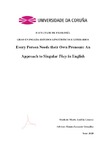Mostrar o rexistro simple do ítem
Every Person Needs their Own Pronoun: An Approach to Singular They in English
| dc.contributor.advisor | Lezcano, Emma | |
| dc.contributor.author | Andión Linares, Marta | |
| dc.contributor.other | Universidade da Coruña. Facultade de Filoloxía | es_ES |
| dc.date.accessioned | 2021-03-05T11:48:28Z | |
| dc.date.available | 2021-03-05T11:48:28Z | |
| dc.date.issued | 2020 | |
| dc.identifier.uri | http://hdl.handle.net/2183/27427 | |
| dc.description.abstract | [Abstract] Over the past few years, there has been an increasing tendency to make language more inclusive, which consists of avoiding the use of the masculine gender as a generic form to refer both to men and women. This paper presents a descriptive and analytical approach to the use of singular they as a valid alternative for an epicene pronoun in English, since the traditional one, generic he, has been recently considered sexist, contributing to the exclusion of women both in society and in the discourse. At the same time, the other possible substitute, the coordinated form he or she, has been rejected by many grammarians and various scholars for making the text unwieldy and cumbersome. For this purpose, this paper offers first a theoretical framework for the justification of the different uses of singular they, taking into account the opinion of various academics like Paterson (2014 and 2011) and Bjorkman (2017), among others, and giving an account of the history of the pronoun they, as well as some of the problems that its singular use causes. Secondly, a complete analysis of a good number of reference grammars and textbooks for students of English as a Foreign Language is carried out in order to reflect upon the presence of this epicene pronoun in different levels of education. Moreover, this paper reports the results of a corpus-based study on the use of singular they in the press. A careful selection of articles from The Guardian and Los Angeles Times was thoroughly analysed in order to obtain convincing evidence of the frequency of usage of this feature in opposition to generic he and he or she. The different contexts, antecedents and linguistic environments triggering their use were carefully studied. The data reveal that singular they is the preferred option for a gender-inclusive pronoun, outperforming generic he and he or she, especially in the course of the 21st century. Thus, the results of this analysis and the generalised use of singular they in recent newspapers offer powerful evidence of the adequacy of this pronoun as an epicene form. In this connection, this end-of-degree project may have a certain relevance in the current social and linguistic context, as feminist movements have been condemning the use of the masculine as a generic, this being considered non-inclusive. All in all, the present study contributes to show the validity and pertinence of singular they nowadays, as well as how social movements can provoke a change in the language. Furthermore, this project could certainly instigate the interest in conducting further research on the topic. | es_ES |
| dc.language.iso | eng | es_ES |
| dc.rights | Os titulares dos dereitos de propiedade intelectual autorizan a visualización do contido deste traballo a través de Internet, así como a súa reproducción, gravación en soporte informático ou impresión para o seu uso privado e/ou con fins de estudo e de investigación. En nengún caso se permite o uso lucrativo deste documento. Estos dereitos afectan tanto ó resumo do traballo como o seu contido Los titulares de los derechos de propiedad intelectual autorizan la visualización del contenido de este trabajo a través de Internet, así como su repoducción, grabación en soporte informático o impresión para su uso privado o con fines de investigación. En ningún caso se permite el uso lucrativo de este documento. Estos derechos afectan tanto al resumen del trabajo como a su contenido | es_ES |
| dc.subject | Singular They | es_ES |
| dc.subject | Gender | es_ES |
| dc.subject | Generic he | es_ES |
| dc.subject | Grammar | es_ES |
| dc.subject | He or she | es_ES |
| dc.subject | Press | es_ES |
| dc.subject | Education | es_ES |
| dc.subject | Corpus | es_ES |
| dc.subject | Sexism | es_ES |
| dc.subject | Gender-inclusive language. | es_ES |
| dc.title | Every Person Needs their Own Pronoun: An Approach to Singular They in English | es_ES |
| dc.type | info:eu-repo/semantics/bachelorThesis | es_ES |
| dc.rights.access | info:eu-repo/semantics/openAccess | es_ES |
| dc.description.traballos | Traballo fin de grao (UDC.FIL). Inglés: estudios lingüísticos y literarios. Curso 2019/2020 | es_ES |






